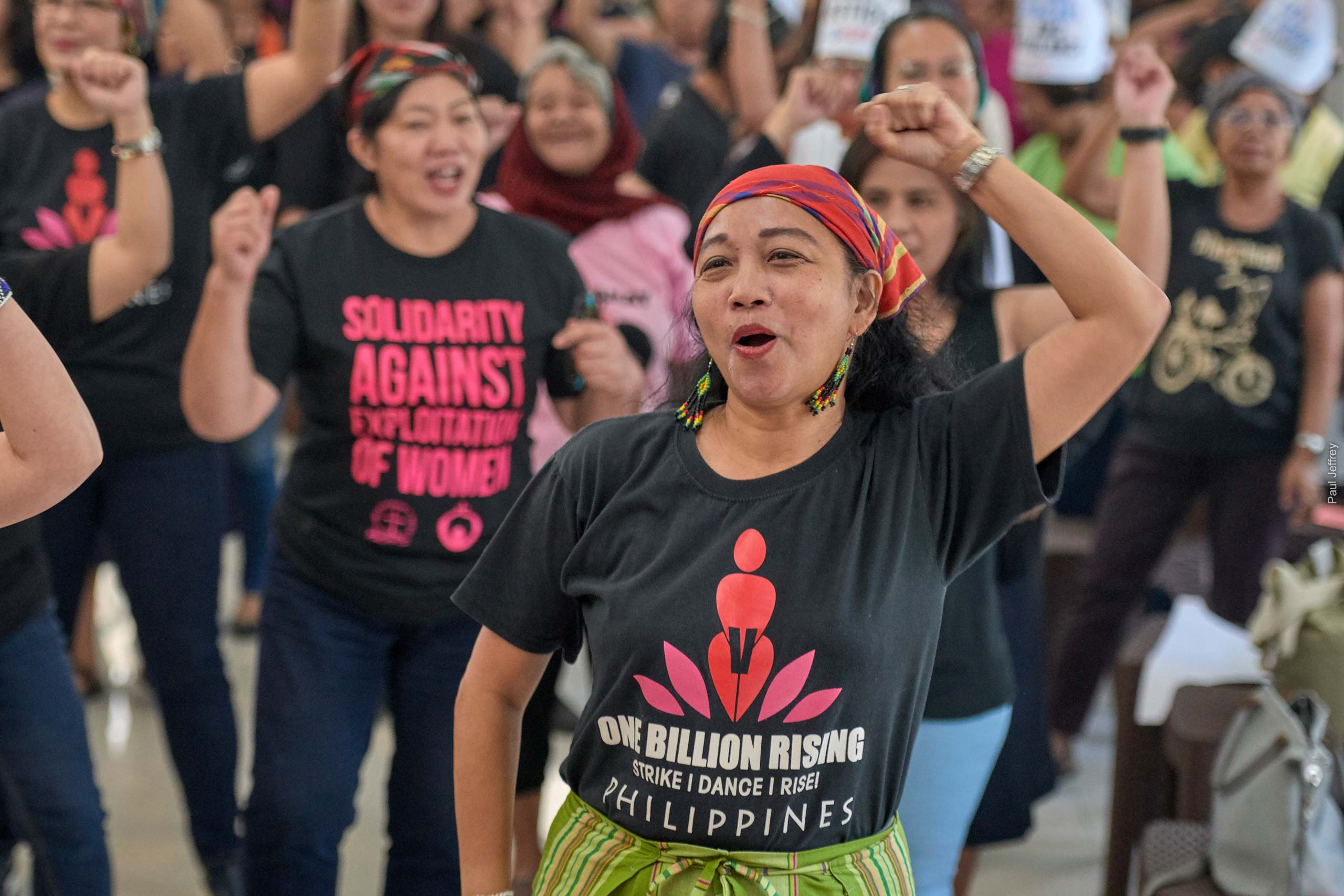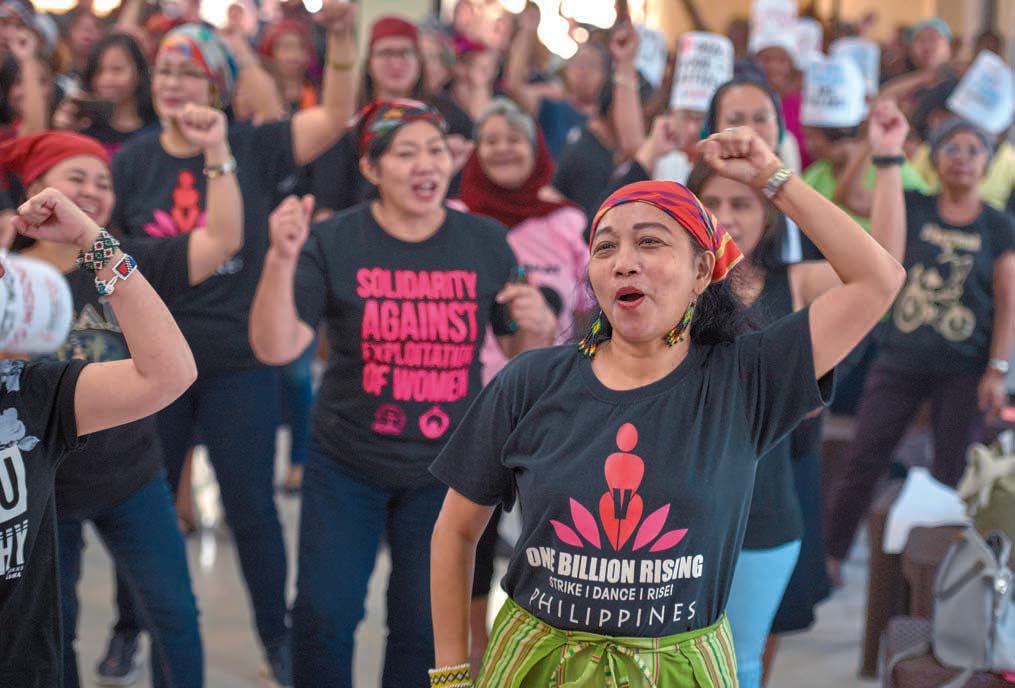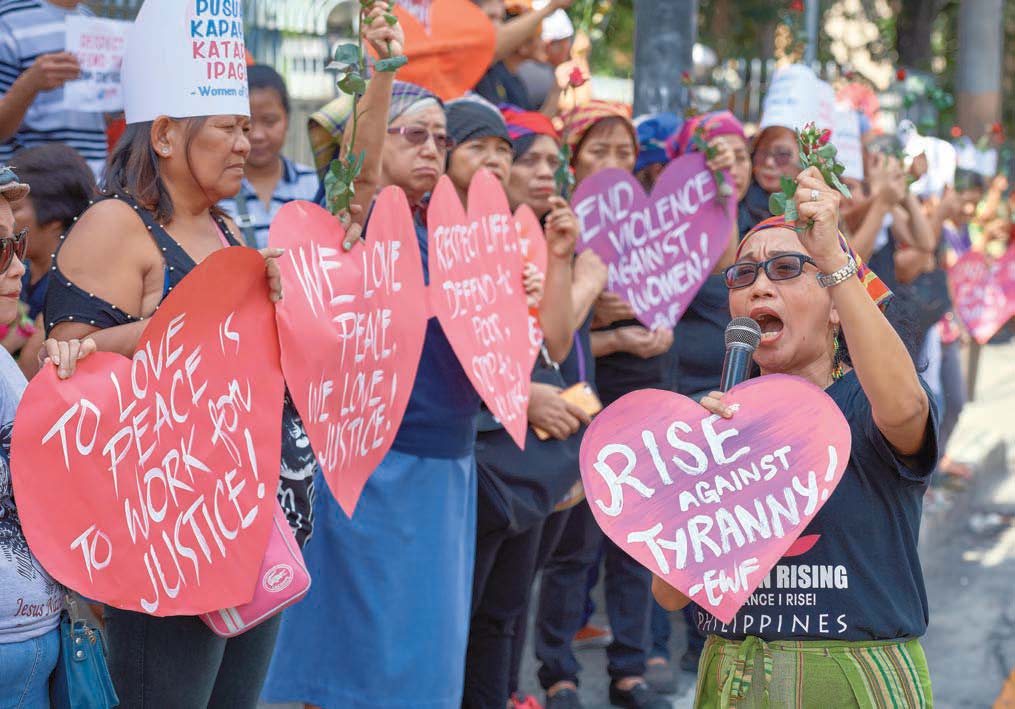
Latest News
July/Aug. response: World Methodist Peace Award
Filipina deaconess honored for justice work
by United Women in Faith
The World Methodist Council has awarded Deaconess Norma Dollaga the World Methodist Peace Award.
Dollaga, who was featured in an article by Paul Jeffrey in the November-December 2019 issue of response, received the honor on April 5, 2024, based largely on her advocacy for the right of the poor not to be killed.
Dollaga is a graduate of United Women in Faith’s historic partner Harris Memorial College, and she works closely with Regional Missionary Emma Cantor in the Philippines, where Dollaga has struggled heroically to forge the justice that makes for peace in her conflict-ridden homeland.

Photo: Paul Jeffrey.
Courage
When a campaign against the use of illegal drugs became a government-sanctioned war against the poor who used drugs, Dollaga became an outspoken advocate for the right of the poor not to be killed. She and other courageous faith leaders refused to be intimidated by then-President Rodrigo Duterte and other government officials who villainized church leaders and others who spoke up for the poor. She organized prayer vigils and memorial services for the dead, people often killed by assassins on motorcycles or unidentified masked men who showed up at night in urban slums with a list of those to be killed.
There was resistance to Dollaga’s work, even from people within the church who supported the president’s policies. Nonetheless, Dollaga courageously persisted in her witness to life.
“People would tell us that it was good that the addicts were being killed,” Dollaga said. “We responded by saying we didn’t oppose efforts to stop the use of illegal drugs. We were against killing people.”
Dollaga has long been an advocate for letting those at the margins speak with their own voice, yet early efforts to get family members of the victims of extrajudicial killings to protest were unsuccessful. “Everyone was afraid, and no one wanted to speak out,” Dollaga said. “They were all afraid that the same will happen to them.”
So with collaboration from Deaconess Rubylin Litao and an ecumenical coalition of church activists and volunteer lawyers, Dollaga formed Rise Up for Life and for Rights. As the bodies piled up, Rise Up started documenting the violence and providing economic and psychosocial support for victims’ families.
The group also provided emotional and spiritual support for the victims’ families. In December 2016, for example, a masked man got off a motorcycle and started shooting up a party in Bagong Silang, a poor neighborhood on the outskirts of Manila. By the time he finished shooting, seven people were dead—including a pregnant woman.
Dollaga and other Rise Up members went to Bagong Silang early the next morning.
“No one wanted to talk to us at first,” she said. “Finally, we met a woman, the mother of one of the dead. She asked us why we were there, and we said, ‘We are from the church.’ So she started to cry and poured out her testimony to us about all that had happened. We listened and then asked if we could pray with her, and she accepted. We asked God to release her from pain. The next day we came back, and, besides coming to listen and pray, we brought flowers. We then asked if we could hold an ecumenical service for them, and they said yes, so we called friends from the Catholic Church and several Protestant denominations and got that organized. But then people got worried because they had no money to pay us. The tradition is that families pay the priest or pastor for this. We said it was free. So we had the service, and kept coming back over the following days. One woman, who was wrestling with hard questions about why her son had died, told me that while she was accustomed to going to the church to pray and seek God’s guidance, she had never had the church come to her. It was the beginning of many evenings with the mothers, listening to them, holding them as they cried, consoling them,” said Dollaga.
Rise Up started organizing support for victims’ families, including health care. When someone survived an attempted assassination, Rise Up found them refuge in churches and convents. Several drug users, fearful of being killed on the street yet also afraid of turning themselves in to the police and dying in custody, instead sought shelter with Rise Up. Dollaga and her colleagues found them discrete shelter—and addiction counseling—in collaborating congregations.
Rise Up started a series of summer camps for the children of victims. Dollaga compared the camps with Sunday school classes, what many in the Philippines consider the traditional domain of deaconesses.
“The only difference is that Sunday school is more for the privileged, for churchgoers, while in the camps we are sharing hope and joy with children of very poor families. For me, this is at the heart of the ministry of a deaconess,” Dollaga said.
In August 2018, Rise Up took another step in its support of victims’ families. Along with six relatives of murdered individuals, it filed a case before the International Criminal Court, accusing Duterte of crimes against humanity. In response, President Duterte pulled the Philippines out of the ICC.
The courageous work of Dollaga and her colleagues has helped the poor move from being victims to being subjects of their own history, protagonists for justice and peace in their communities. Such empowerment, Dollaga has argued, preserves the agency and dignity of each individual.
Roselle Tullao, an organizer for Rise Up, said the transformation is inspiring.
“When Norma (Dollaga) and I go to a village where a killing has happened, people are usually afraid at first to talk about it. They’re scared. We’re afraid too, and we’re honest with them about that. But we believe that hope is more powerful than fear, because we’ve seen that happen as the mothers have decided to leave their fear behind and rise up,” Tullao said.
“When we started this, we would accompany the mothers as they went to file charges. They would always cover their faces, and we had to ask the media not to take their photos. But slowly they have lost their fear and uncovered their faces. I am humbled by the power that these poor women possess, and thankful that they’ve shared it with us as we struggle together. The women are pushing their cases, and we are blessed by their persistence.”
Creativity
As can be seen in her founding of Rise Up, Dollaga has developed a knack for empowering others to join the struggle for justice and peace. She’s far from a lone leader, instead working in the trenches to help others move forward.
A deaconess since her graduation from Harris Memorial College in 1985, she has been appointed since 2000 by the bishop of the Philippines Central Conference to the Ecumenical Center for Development, also known as Kapatirang Simbahan Para sa Bayan (the Church of the People). As the organization’s general secretary, she has helped shepherd ecumenical groups and networks focusing on human rights and peace. In addition to Rise Up, these include Dambana, which provides humanitarian assistance to communities affected by disasters and the climate crisis, and One Voice, an alliance of Catholic and Protestant church leaders advocating for human rights and good governance.
Dollaga is also a painter and poet, and her creative expression—like her community organizing—focuses on the lived experience of poor women, Indigenous people, slum dwellers, and others at the margins of Philippine society.

Consistency
United Methodist deaconesses in the Philippines are an amazing group of women. Yet the contributions they make to ministries both within and outside the church are often unrecognized by male church leaders. Frustrated with low pay and outright discrimination, it’s not surprising that many have abandoned their official deaconess status for better pay or more effective work unrelated to the church. Deaconesses have left the church to become pastors, social workers, government officials, and guerrilla insurgents.
Despite the myriad challenges, Dollaga has stayed true to her calling and appointment as a deaconess, and has become an inspiring model for younger deaconesses interested in deepening their Wesleyan witness to personal and social holiness within the Philippines. She frequently teaches classes and leads seminars as a member of the faculty at Harris Memorial College, the regional training ground for deaconesses and women leaders in The United Methodist Church and other denominations.
While leading street demonstrations and testifying at legislative hearings is part of Dollaga’s public persona, her witness is deep and comprehensive. Just as her work with Rise Up combined public protagonism with behind- the-scenes pastoral support for the victims of violence, so her work in the campaign to save Mary Jane Velasco—a Filipina migrant worker imprisoned in Indonesia—and her work demanding justice after the 2014 murder of Jennifer Laude—a trans woman—was accompanied by pastoral and other support for the women’s families.
While leading demonstrations for Indigenous rights in the streets, she has also raised funds to build schools for displaced Indigenous children. While publicly demanding the resumption of peace talks between the government and the National Democratic Front, she has offered support for the families of people killed in the war’s all-too-frequent massacres.
Such ministry combines concrete solidarity with a pastoral accompaniment that offers the gift of hope to those left hurting and grieving.
Former Manila Area Bishop Ciriaco Q. Francisco characterized Dollaga’s ministry with the marginalized as “heroic work for the Lord.”
Dollaga has for decades displayed the courage, creativity, and consistency that mark her as a true disciple of Jesus Christ, proclaiming abundant life to all, especially those victims of injustice in her homeland. Because she has embodied both compassion and resilience as she has witnessed for true peace in the Philippines, it is an honor to nominate her for the World Methodist Peace Award.
This article is the nomination statement for Norma Dollaga written by Paul Jeffrey, portions of which were included in a statement supporting the nomination submitted by United Women in Faith General Secretary and CEO Sally Vonner. Photos originally appeared with Paul Jeffrey’s 2019 article, “War Against the Poor in the Philippines.”

